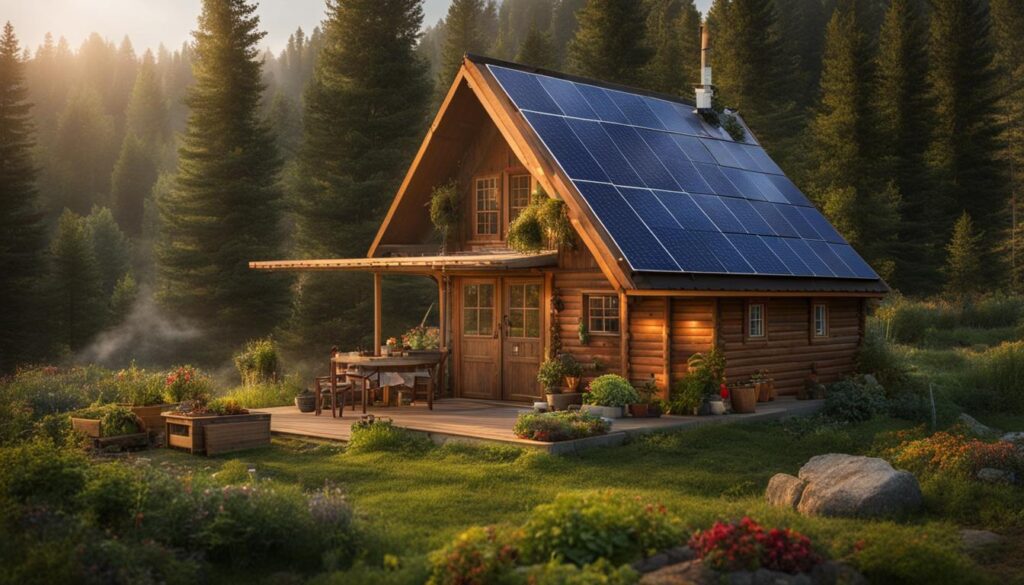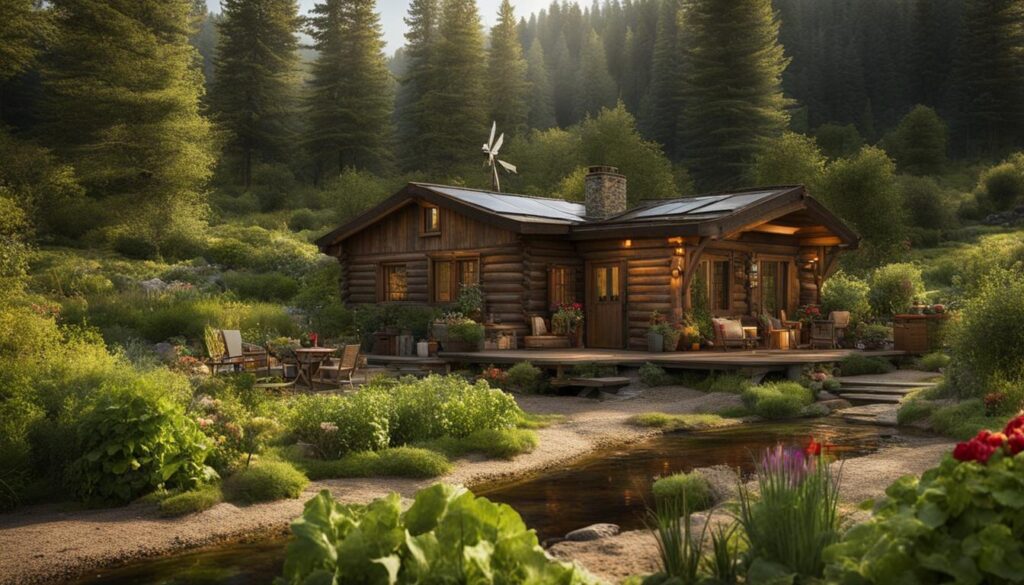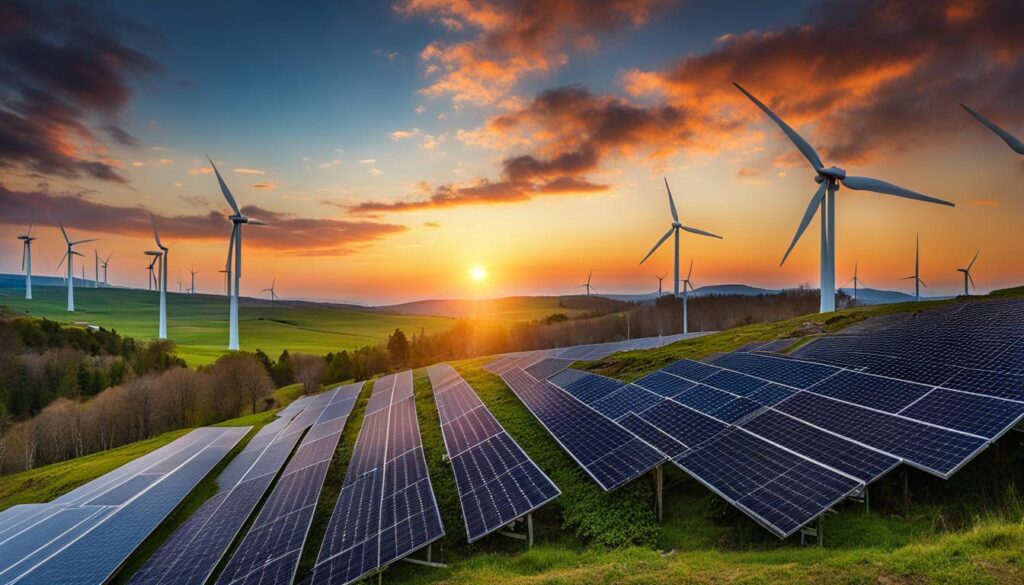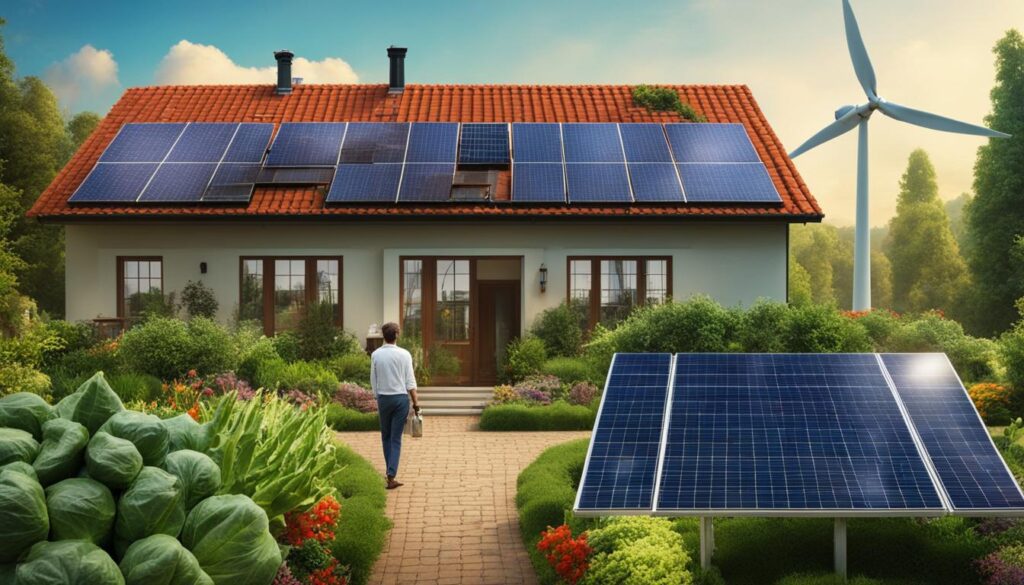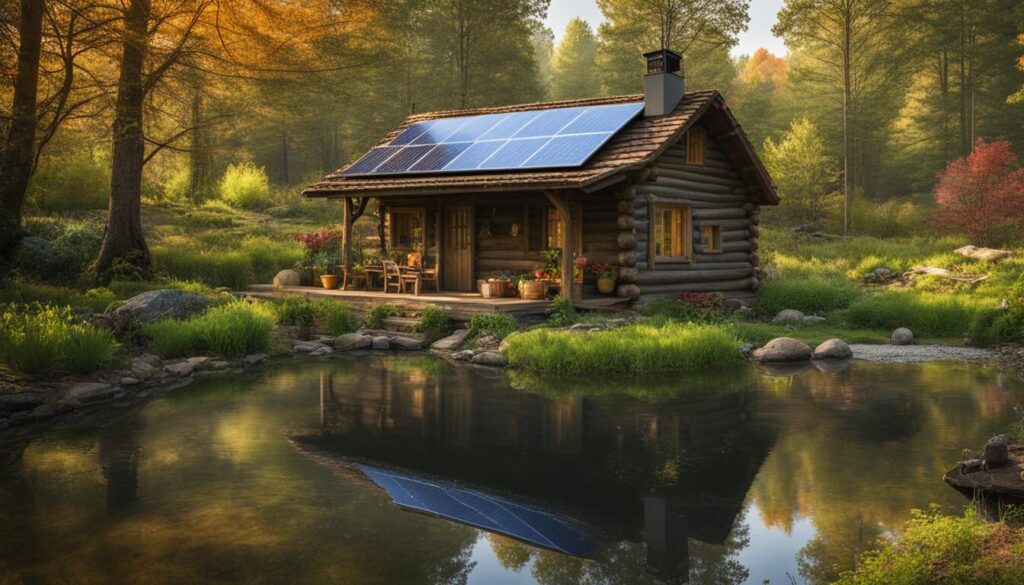Welcome to my blog where I’ll be sharing the wonders of off-grid living with you. Are you ready to discover the joys of self-sufficiency, sustainable living, and renewable energy? Living off the grid offers an incredible opportunity to break free from the shackles of mainstream society and embark on a journey towards a more fulfilling and connected life.
Imagine waking up each morning to the sounds of nature, knowing that you are generating your own power responsibly and minimizing your impact on the planet. With off-grid living, you can achieve energy independence, reduce reliance on fossil fuels, and bask in the serenity of remote landscapes.
But that’s not all! By embracing the off-grid lifestyle, you’ll also enjoy significant cost savings, financial freedom, and a stronger sense of self-sufficiency. From growing your own food to conserving water and managing waste sustainably, every aspect of off-grid living contributes to a more harmonious relationship with the environment.
Throughout this blog, I’ll be sharing valuable insights, practical tips, and inspiring stories of individuals who have successfully made the transition to off-grid living. Whether you’re curious about renewable energy, yearning for a connection with nature, or simply seeking a lifestyle that aligns with your values, off-grid living has something incredible to offer.
How to Live Off the Grid Key Points
- Living off the grid offers energy independence, environmental sustainability, cost savings, self-sufficiency, and a connection with nature.
- Off-grid living allows individuals to generate their electricity using renewable energy sources such as solar, wind, or hydropower, reducing reliance on fossil fuels.
- Off-grid living promotes environmental sustainability through the use of renewable energy sources, water conservation, organic gardening, and sustainable waste management.
- While the initial investment in off-grid infrastructure may be higher, the long-term cost savings are substantial.
- Off-grid living encourages self-sufficiency by growing food, collecting rainwater, and utilizing renewable energy, reducing reliance on external systems.
Energy Independence: Generating Your Own Power
Living off the grid offers a unique opportunity to achieve energy independence and reduce reliance on fossil fuels. One of the key ways to attain this independence is by generating your own power through renewable energy sources.
Renewable energy sources such as solar, wind, and hydropower can be harnessed to generate electricity for off-grid dwellers. Solar panels convert sunlight into electricity, while wind turbines harness the power of the wind and hydropower systems utilize flowing water to generate energy. By utilizing these renewable energy sources, off-grid individuals can reduce or eliminate their dependence on fossil fuels, contributing to a cleaner and greener environment.
Embracing renewable energy not only benefits the planet but also offers long-term cost savings. While the initial investment in installing solar panels or wind turbines may be higher, the ongoing costs of generating electricity are significantly lower. By harnessing the power of nature, off-grid living provides a sustainable and cost-effective solution for energy needs.
Furthermore, generating your own power empowers you to have greater control over your energy consumption. You can optimize your energy usage and conserve power when necessary, ensuring that energy is utilized efficiently and minimizing waste.
Key Benefits of Generating Your Own Power:
- Reduces or eliminates reliance on fossil fuels
- Increases energy independence
- Contributes to a cleaner and greener environment
- Provides long-term cost savings
- Empowers you to have greater control over your energy consumption
By embracing renewable energy sources and generating your own power, you can play an active role in reducing carbon emissions, preserving the environment, and enjoying the benefits of energy independence. Living off the grid allows you to take charge of your energy needs and make a positive impact on both your life and the planet.
Minimizing Impact on the Planet: Embracing Environmental Sustainability
As an off-grid dweller, one of the core principles that guide my lifestyle is the commitment to minimizing my impact on the planet. Through the adoption of renewable energy sources, eco-friendly practices, water conservation, and sustainable waste management, I strive to reduce my carbon footprint and contribute to the global effort in combating climate change.
Promoting Renewable Energy Sources
One of the key aspects of living off the grid is harnessing the power of renewable energy sources. By installing solar panels, wind turbines, or micro-hydro systems, I can generate clean and sustainable electricity for my daily needs. This not only reduces my reliance on fossil fuels but also helps to preserve our environment for future generations.
Adopting Eco-Friendly Practices
In addition to renewable energy, I believe in incorporating eco-friendly practices into every aspect of my off-grid lifestyle. From using energy-efficient appliances to opting for natural and organic materials in construction and furniture, I prioritize choices that have a lower impact on the environment. These practices not only contribute to a greener future but also inspire others to make positive changes in their own lives.
Conserving Water for a Sustainable Future
Water conservation is another crucial element of my environmental sustainability efforts. By collecting rainwater through a system of gutters and storage tanks, I can reduce my reliance on municipal water supplies. This not only helps to conserve this precious resource but also eliminates the need for energy-intensive water treatment processes. Additionally, I practice responsible water usage by implementing low-flow fixtures and water-efficient appliances to further reduce my consumption.
Prioritizing Sustainable Waste Management
Living off the grid has also taught me the importance of sustainable waste management. I prioritize reducing, reusing, and recycling materials whenever possible. Composting organic waste helps create nutrient-rich soil for my organic garden, completing the cycle of sustainability. By minimizing the amount of waste I produce and ensuring proper disposal, I contribute to the preservation of our natural resources and prevent pollution.
By embracing environmental sustainability in my off-grid lifestyle, I believe that each small action I take has a significant impact on the planet. From harnessing renewable energy sources to incorporating eco-friendly practices, conserving water, and adopting sustainable waste management, I am contributing to a greener, more sustainable future.
Cost Savings: Financial Freedom and Stability
When considering off-grid living, one may wonder about the financial implications. While it’s true that the initial investment in off-grid infrastructure may be higher, the long-term cost savings are substantial. By generating their own electricity and relying on sustainable practices, off-grid dwellers can significantly reduce or even eliminate monthly utility bills, providing financial freedom and stability.
One of the primary advantages of off-grid living is the ability to generate your own power. Through the use of renewable energy sources, such as solar panels or wind turbines, individuals can produce electricity without depending on traditional utility providers. This results in a drastic reduction in or complete elimination of utility bills, freeing up funds for other expenses or savings.
Aside from the obvious savings on electricity, off-grid living also allows for reducing costs in other areas. For example, harnessing rainwater for household use not only reduces reliance on the municipal water supply but also lowers water bills. Implementing energy-efficient practices, such as insulation and efficient appliances, can further optimize energy consumption and reduce expenses.
In addition to cost savings, off-grid living offers a unique opportunity for financial stability. As utility prices continue to rise, off-grid dwellers are shielded from such fluctuations. By generating their own power and relying on sustainable systems, individuals are less vulnerable to the impact of rising energy costs, providing them with long-term financial security.
The Benefits of Cost Savings in Off-Grid Living:
- Significantly reduced or eliminated monthly utility bills
- Financial freedom and stability
- Protection against rising energy costs
- Opportunity to allocate saved funds towards other priorities
Living off the grid not only reduces one’s environmental impact and promotes self-sufficiency but also brings about significant financial advantages. With cost savings on utility bills and increased financial stability, off-grid living offers the opportunity for individuals to achieve a greater sense of freedom and control over their finances.
Self-Sufficiency: Meeting Your Own Needs
In the realm of off-grid living, self-sufficiency is a core principle. It empowers individuals to meet their own needs and reduces reliance on external systems. By embracing sustainable practices, such as growing our own food, collecting rainwater, and utilizing renewable energy sources, we can create a lifestyle that promotes a stronger connection with the natural world.
1. Growing Your Own Food
One of the most rewarding aspects of off-grid living is the ability to cultivate a thriving garden. By growing your own fruits, vegetables, and herbs, you become less dependent on grocery stores and have access to fresh, organic produce. It’s a chance to reconnect with the earth, nurture plants from seed to harvest, and savor the taste of homegrown goodness.
2. Collecting Rainwater
In an off-grid setting, rainwater becomes a valuable resource. By implementing rainwater harvesting systems, you can collect and store this abundant natural resource for various uses, such as watering your garden, flushing toilets, or even washing clothes. Not only does this reduce dependence on municipal water supplies, but it also ensures a sustainable water source in times of drought or emergencies.
3. Utilizing Renewable Energy
Off-grid living provides an opportunity to tap into the endless potential of renewable energy sources. By harnessing the power of the sun, wind, or water, we can generate clean electricity to meet our energy needs. Installing solar panels, wind turbines, or even micro-hydro systems allows us to enjoy modern comforts while minimizing our impact on the environment and reducing reliance on fossil fuels.
By embracing self-sufficiency in these key areas, we not only ensure our basic needs are met but also contribute to a more sustainable future. Off-grid living empowers us to take control of our lives and make conscious choices that align with our values of environmental stewardship and sustainable living.
Freedom and Connection with Nature: Reconnecting with the Earth
Living off the grid offers a unique opportunity to escape the hustle and bustle of urban life and rediscover the true beauty of nature. When you choose to live off the grid, you embrace a lifestyle that prioritizes freedom, tranquility, and a deep connection with the natural world.
Imagine waking up to the sound of birds chirping and the gentle rustling of leaves. Away from the noise and pollution of the city, off-grid living allows you to fully immerse yourself in the sights, sounds, and scents of nature. Whether it’s the breathtaking landscapes of the countryside or the serene beauty of a remote mountain retreat, living off the grid offers a front-row seat to the wonders of the earth.
Surrounded by lush forests, rolling meadows, or vast expanses of untouched wilderness, you’ll feel a sense of freedom like never before. Without the constraints of modern society, you have the opportunity to live life on your own terms and fully embrace the simplicity and tranquility that off-grid living offers.
Living close to nature also provides numerous mental and emotional benefits. Scientific studies have shown that spending time in nature can reduce stress, improve mood, and enhance overall well-being. By disconnecting from the distractions of technology and immersing ourselves in nature, we gain a deeper appreciation for the beauty and serenity of the natural world.
Whether you choose to go off the grid in a cozy cabin in the woods, a sustainable earthship, or a remote off-grid community, the freedom and connection with nature that off-grid living provides is unparalleled. It’s a chance to slow down, find peace, and truly reconnect with the earth.
Resilience and Preparedness: Thriving in Any Situation
Living off the grid not only offers the freedom to live sustainably and self-sufficiently but also equips individuals with valuable skills and resources to thrive in any situation. In a world of uncertainties, being prepared and resilient becomes essential.
One of the key aspects of off-grid living is having independent energy sources. By harnessing renewable energy like solar panels or wind turbines, individuals can power their homes even when the grid goes down. This ensures a continuous power supply, essential for communication, refrigeration, and other necessities.
Water is another crucial resource that off-gridders are prepared for. With rainwater harvesting systems and efficient water management practices, they can maintain a sustainable water supply even during droughts or water shortages. This self-sufficiency eliminates the reliance on municipal water sources, ensuring a constant water supply.
Moreover, off-gridders prioritize sustainable food production systems, such as permaculture and organic gardening. They have the knowledge and skills to grow their own food, reducing dependence on external food sources. This level of self-sufficiency ensures access to fresh, nutritious food regardless of disruptions in the food supply chain.
Key Tips for Resilience and Preparedness
- Invest in renewable energy systems like solar panels or wind turbines for independent power generation.
- Implement rainwater harvesting systems and practice water conservation for a sustainable water supply.
- Learn and develop skills in permaculture and organic gardening to ensure a self-sufficient food production system.
- Establish emergency communication systems to stay connected with the outside world during disruptions.
- Build a resilient infrastructure, including backup systems and storage, to withstand unexpected challenges.
By embracing off-grid living, individuals gain not only the freedom to live sustainably but also the resilience and preparedness to thrive in any situation. With independent energy sources, a sustainable water supply, and the ability to grow their own food, off-gridders have the peace of mind that comes with being self-sufficient.
Off-Grid Living: A Paradigm Shift towards Sustainability
Living off the grid is a lifestyle that represents a paradigm shift towards a more sustainable and self-sufficient way of life. It is a conscious choice to break free from the reliance on traditional systems and embrace a holistic approach to living.
By opting for off-grid living, individuals have the unique opportunity to live in harmony with nature and reduce their environmental impact. They become stewards of the earth, actively working towards a greener and cleaner planet.
Reducing Environmental Impact
Off-grid living allows individuals to reduce their reliance on non-renewable resources and minimize their carbon footprint. By embracing renewable energy sources such as solar or wind power, off-gridders can generate their own clean and sustainable energy.
Additionally, off-grid living promotes environmental consciousness through practices like water conservation, sustainable waste management, and organic gardening. These practices contribute to the preservation of natural resources and protect the delicate balance of ecosystems.
Greater Energy Independence
When living off the grid, individuals gain the freedom and autonomy to produce their own energy, reducing their dependence on traditional power grids. This energy independence not only provides a sense of self-sufficiency but also insulates off-gridders from fluctuations in energy prices and potential disruptions in the grid.
A Shift towards Self-Sufficiency
Off-grid living encourages a shift towards self-sufficiency, empowering individuals to meet their own needs. By growing their own food, harvesting rainwater, and implementing sustainable practices, off-gridders become less reliant on external systems.
This self-sufficiency fosters a sense of empowerment and resilience, as off-gridders possess the knowledge and skills necessary to thrive in any situation. They develop a deep connection to the natural world and gain a renewed appreciation for the resources it provides.
Embracing Personal and Environmental Responsibility
Living off the grid is an embodiment of personal and environmental responsibility. Off-gridders proactively take charge of their impact on the planet, making conscious choices that minimize harm and maximize sustainability.
By embracing this lifestyle, individuals become ambassadors for environmental consciousness, inspiring others to reevaluate their own consumption patterns and consider the benefits of off-grid living.
Off-grid living represents a profound shift in mindset, a commitment to sustainable living, and a dedication to preserving the planet for future generations. It is a way of life that offers not only environmental benefits but also a sense of purpose, connection, and personal fulfillment.
The Inspiring Journey of Chad and Rhonda: Living Off the Grid
Let me introduce you to Chad and Rhonda, a couple who embarked on an incredible journey of off-grid living. They made a conscious decision to embrace a sustainable lifestyle, prioritizing self-sufficiency and environmental consciousness.
Chad and Rhonda’s inspiring story began when they realized the potential of off-grid living. They saw it as an opportunity to not only reduce their environmental impact but also to create a life of freedom and connection with nature.
Determined and motivated, Chad and Rhonda built their own sustainable, self-sufficient home. They focused on utilizing renewable energy sources such as solar panels and wind turbines, which provided them with the power they needed to live comfortably off the grid.
In addition to generating their own electricity, Chad and Rhonda implemented various sustainable practices. They developed water conservation systems, collecting rainwater for daily use and implementing eco-friendly waste management techniques. Their home also features a thriving organic garden, offering them fresh and nutritious food year-round.
Living off the grid has brought immense joy and fulfillment to Chad and Rhonda’s lives. They have gained a deep appreciation for the natural world, regularly spending time outdoors and immersing themselves in the beauty of their surroundings.
Chad and Rhonda’s journey serves as an inspiration to others who are considering a life of off-grid living. Their story highlights the rewards of living self-sufficiently and embracing a sustainable lifestyle. They have found true freedom in their decision and urge others to join them on this transformative path.
Through their determination and dedication, Chad and Rhonda have shown that off-grid living is not only feasible but also incredibly fulfilling. Their story reinforces the idea that we all have the power to make a positive impact on the world and live in harmony with nature. By pursuing a sustainable lifestyle and embracing self-sufficiency, we can create a better future for ourselves and future generations.
Off the Grid: Pursuit of Freedom in an Off-Grid Lifestyle
Living off the grid is not for the faint-hearted. It requires grit, resilience, and a willingness to adapt to a different way of life. But in return, it offers unparalleled freedom and the opportunity to live life on your own terms.
When you choose to embrace the off-grid lifestyle, you disconnect from the trappings of modern society. No longer bound by utility bills, commuting, or the constant buzz of technology, you can create a sanctuary of self-sufficiency and true connection with nature.
Freedom becomes your compass as you carve out a path that aligns with your values. You have the freedom to build your own sustainable home, powered by renewable energy sources such as solar, wind, or hydro power. With every ray of sunlight or gust of wind, you harness the power to fuel your daily needs.
Self-sufficiency takes center stage as you grow your own food, tapping into the earth’s bounty and embracing organic gardening practices. Rainwater becomes your lifeline as you collect and utilize this precious resource for washing, bathing, and irrigation.
The off-grid lifestyle allows you to rediscover the joy of simplicity and the satisfaction that comes with meeting your own needs. It empowers you to take responsibility for your own choices and actions, fostering a sense of autonomy and self-reliance.
But it’s not just about independence. Living off the grid also offers a deeper connection with nature. Surrounded by breathtaking landscapes and untouched wilderness, you find solace and tranquility in the embrace of the great outdoors. Your mornings are greeted by birdsong, and your evenings are serenaded by the rustling of leaves and the gentle flow of a nearby stream.
The pursuit of an off-grid lifestyle challenges societal norms and encourages you to question the status quo. It invites you to reimagine what freedom truly means and to find liberation in the simplicity of sustainable living.
Living off the grid is more than just a lifestyle choice; it’s a daring adventure that unlocks the full potential of living in harmony with the Earth. In the pursuit of freedom, self-sufficiency, and an off-grid lifestyle, you discover a profound sense of fulfillment and connection that transcends the boundaries of modern living.
Conclusion
Living off the grid allows individuals to embrace freedom, sustainability, and a deeper connection with nature. It provides energy independence, environmental sustainability, cost savings, and self-sufficiency. Choosing the off-grid lifestyle offers a fulfilling and rewarding way of living for those seeking a truly sustainable future.
By generating their own power through renewable energy sources such as solar, wind, or hydro power, off-grid dwellers reduce their reliance on fossil fuels and increase their energy independence. This not only benefits the environment but also ensures a consistent and reliable energy supply.
Additionally, off-grid living promotes environmental sustainability through practices such as water conservation, sustainable waste management, and organic gardening. By minimizing their carbon footprint, off-grid individuals contribute to the global effort to combat climate change and protect our planet for future generations.
While the initial investment in off-grid infrastructure may be higher, the long-term cost savings are substantial. By reducing or eliminating monthly utility bills, off-grid dwellers gain financial freedom and stability, allowing them to focus on other aspects of their lives and pursue their passions. Furthermore, the pursuit of self-sufficiency through growing food, collecting rainwater, and utilizing renewable energy sources fosters a stronger connection with nature and promotes a sense of personal empowerment.
FAQ
What is off-grid living?
Off-grid living is the lifestyle of living without reliance on public utilities and infrastructure, such as electricity, water, and waste management systems. It involves generating one’s own electricity through renewable energy sources, conserving water, and utilizing sustainable practices for waste management.
How can I generate my own power off the grid?
Off-grid dwellers can generate their own power using renewable energy sources such as solar panels, wind turbines, or micro-hydro systems. These systems convert natural elements like sunlight, wind, or flowing water into electricity, providing a sustainable and independent energy source.
How does off-grid living promote environmental sustainability?
Off-grid living promotes environmental sustainability by relying on renewable energy sources, conserving water, practicing organic gardening, and adopting sustainable waste management methods. This reduces reliance on fossil fuels, minimizes the carbon footprint, and contributes to the global effort to combat climate change.
Will off-grid living save me money?
Yes, off-grid living can lead to significant cost savings. While the initial investment in off-grid infrastructure may be higher, living off the grid allows individuals to reduce or eliminate monthly utility bills. Generating your own electricity and adopting sustainable practices can provide long-term financial freedom and stability.
How can off-grid living increase self-sufficiency?
Off-grid living promotes self-sufficiency by encouraging individuals to grow their own food, collect rainwater, and generate their own energy. By reducing reliance on external systems, off-grid dwellers become more self-reliant and develop valuable skills and resources for sustainable living.
What are the benefits of reconnecting with nature through off-grid living?
Living off the grid allows individuals to escape urban life and reconnect with nature. It provides a sense of freedom, tranquility, and a deeper appreciation for the natural world. Living in remote locations surrounded by breathtaking landscapes enhances the connection with nature and brings a renewed sense of wonder and well-being.
How does off-grid living promote resilience and preparedness?
Off-grid living equips individuals with valuable skills and resources for emergencies or disruptions. Independent energy sources, water supply systems, and sustainable food production methods provide resilience and a sense of security, ensuring that off-grid dwellers can thrive in any situation.
What is the philosophy behind off-grid living?
Off-grid living represents a paradigm shift towards a more sustainable and self-sufficient way of life. It allows individuals to live in harmony with nature, reduce their environmental impact, and achieve greater energy independence. The off-grid lifestyle fosters a sense of personal and environmental responsibility.
Can you share an inspiring real-life story of off-grid living?
Chad and Rhonda are a couple who embraced off-grid living and built a sustainable, self-sufficient home. Their journey inspires others to pursue a life of independence and self-sufficiency, showcasing the rewards of living off the grid. Their story is a testament to the possibilities and fulfillment that come with this lifestyle.
Is off-grid living for everyone?
Off-grid living requires grit, resilience, and a willingness to adapt. While it offers freedom and a deeper connection with nature, it may not be suitable for everyone. It is important to consider factors such as location, resources, and personal preferences before embarking on an off-grid lifestyle.
What are the key takeaways from the off-grid lifestyle?
Living off the grid allows individuals to embrace freedom, sustainability, and a deeper connection with nature. It provides energy independence, environmental sustainability, cost savings, and self-sufficiency. While it may not be for everyone, those who choose the off-grid lifestyle discover a fulfilling and rewarding way of living.

